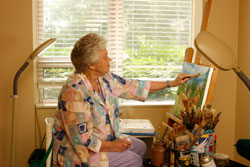Nashville, TN – August 5, 2013 – Mariana G. Figueiro, Ph.D., of the Lighting Research Center at Rensselaer Polytechnic Institute in Troy, N.Y., recently published in the Journal of Alzheimer’s Disease her findings on lighting for people living with Alzheimer’s disease.

Abe’s Garden, the only Alzheimer’s community in the nation founded exclusively to develop and disseminate evidence-based, best practices in dementia care, assisted in the publishing of Figueiro’s research. Abe’s Garden board members, Christopher Brown and Michael D. Shmerling, along with the National Institute on Aging and the National Institute of Nursing Research, provided funding for Figueiro’s studies. Her research focuses on two key principles: sleep issues and safety concerns. Abe’s Garden CEO Andrew Sandler, Ph.D., says Figueiro’s research will be integrated into the campus, design, programming, and construction.
According to the study, typical institutional light levels are not high enough during waking hours or tuned to the correct color to activate the circadian system in elderly people, often resulting in sleep disruption. This disruption causes changes in sleep patterns, confusion in daily routines, decreased alertness, and mood alteration resulting in feelings of depression. Abnormal sleep patterns tend to increase with the progression of Alzheimer’s disease and related dementias (ADRD) and are associated with aggressive behavior and caregiver stress.
To improve the health and quality of life for individuals with ADRD, Figueiro recommends a 24-hour lighting scheme designed to provide high circadian stimulation during the day, low circadian stimulation at night, good visual conditions during waking hours, and nightlights that are safe and minimize sleep disruption. ADRD disrupts higher cognitive processes and may result in significantly greater balance and coordination issues, increasing an individual’s risk for falls. Lighting modifications may reduce the risk of falls, especially at night, when light levels are low.
“Though I’ve worked with Dr. Figueiro on numerous initiatives, it has been most gratifying to witness her commitment to understanding the profound impact that lighting has on older adults, particularly individuals with Alzheimer’s,” Brown said. “Her commitment resulted in publishing groundbreaking research and Abe’s Garden is honored to support these efforts.”
Christopher Brown and Scott Muse, President of Hubbell Lighting, are leading an effort to integrate Figueiro’s research findings into the design and construction of its campus, and continue development of state of the art lighting strategies by raising $150,000 to fund the Research Office at Abe’s Garden. Those wishing to participate in the initiative may make a tax-deductible contribution at http://abesgarden.org or text MEMORY to 20222 to make a $10 contribution (Message and Data Rates May Apply)
“Light is the most powerful synchronizer of the human circadian clock, and the timing and type of light exposure during the course of a day is responsible for how the circadian clock is synchronized with the environment. Our industry is developing lighting products that have a positive impact on the way people live their lives, and we are pleased to work with Abe’s Garden to move those from lab to reality,” said Scott Muse.
“Although there is currently no method to prevent, treat, or cure Alzheimer’s disease, there is expanding interest in it. Abe’s Garden is a pioneer in the field, integrating research and applying best practices to care that will improve the lives of persons with Alzheimer’s, their care partners, and families,” said Sandler.
About Abe’s Garden
Abe’s Garden is a 501(c)(3) organization, founded in 2007. In 2008, the Nashville-based organization purchased Park Manor, a well-established senior independent lifestyle community; and recently converted the second floor to an assisted living community in response to the needs of its current and future residents. On the Park Manor campus, Abe’s Garden will provide evidence-based adult daycare and residential services designed specifically for individuals suffering from Alzheimer’s disease.
Abe’s Garden will develop best practices for dementia care through a planned collaboration with Vanderbilt Center for Quality Aging. This partnership will allow Vanderbilt to develop a joint research program targeting improvement in the quality of care provided to residents. A hallmark of the collaboration is the recently endowed Vanderbilt University Abram C. Shmerling, M.D. Chair in Alzheimer’s and Geriatric Medicine. For more information, visit http://abesgarden.org .
Advertisement
Learn more about Rensselaer Polytechnic Institute





